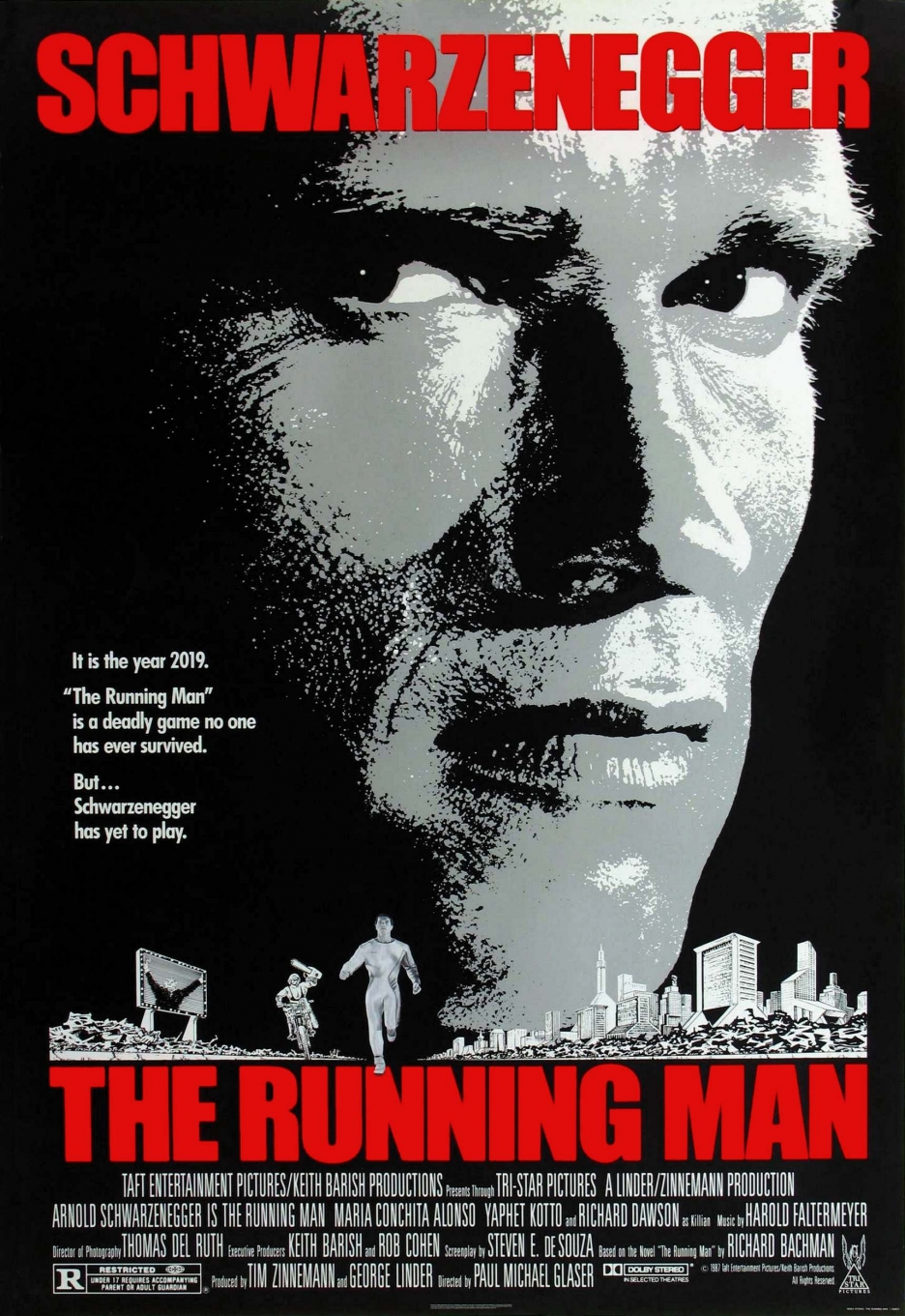Arnold Schwarzenegger in a brightly-colored jumpsuit wielding a chainsaw isn’t something you forget easily, but then again, few things about The Running Man are. The 1987 cult classic, based loosely on Stephen King’s novel (written under the pseudonym Richard Bachman), is a high-octane blend of dystopian sci-fi, satirical social commentary, and unabashed 80s action madness. If you haven’t seen this delightfully bonkers movie, let’s dive into why it still holds a special place in pop culture—even as a darker update looms on the horizon.
Plot Recap: Welcome to the Future
The year is 2017 (as imagined in 1987), and society has devolved into a totalitarian state where the government keeps the masses entertained through a sadistic reality TV show called The Running Man. Convicted criminals are pitted against professional “stalkers” in a deadly arena, all for the public’s amusement. Enter Ben Richards (Schwarzenegger), a former police officer framed for a massacre. After escaping prison with a ragtag group of rebels, Richards is captured and forced to compete in the show.
The movie takes us through a series of increasingly absurd battles as Richards faces off against a lineup of flamboyant stalkers, each with a gimmick more ridiculous than the last. Along the way, he teams up with Amber Mendez (Maria Conchita Alonso), who uncovers the truth behind the government’s propaganda. The film culminates in an explosive finale where Richards takes down the system, proving once and for all that he’s got more than just muscles—he’s got quippy one-liners too.
Cameos Galore: A Who’s Who of 80s Icons
One of the movie’s most endearing qualities is its parade of familiar faces. If you’re a fan of 80s pop culture, spotting these cameos is half the fun:
- Jesse Ventura: Before he became the Governor of Minnesota, Ventura was Captain Freedom, a retired stalker with a flair for melodrama. His over-the-top training montage is peak 80s cheese.
- Jim Brown: The NFL legend plays Fireball, a flamethrower-wielding stalker with a jetpack. Because of course, there’s a jetpack.
- Mick Fleetwood: Yes, of Fleetwood Mac fame. He appears as Mic, a leader of the resistance who helps Richards take down the show. His presence is random but oddly fitting.
- Richard Dawson: Best known as the host of Family Feud, Dawson is pitch-perfect as the smarmy and sadistic Damon Killian, the show’s host. His performance is so deliciously slimy that it’s hard to imagine anyone else in the role.

These cameos, along with Schwarzenegger’s undeniable charisma, elevate the movie from a standard dystopian action flick to a uniquely memorable experience.
From Page to Screen: The Source Material
The movie is loosely based on Stephen King’s 1982 novel, but fans of the book will notice significant differences. King’s version is a much darker, grittier tale, with the protagonist participating in the deadly game show to earn money for his family. The tone is bleak, and the story explores themes of desperation and systemic inequality in greater depth.
By contrast, the film trades much of the novel’s introspection for explosive action and campy humor. While this departure might disappoint purists, it’s also what makes the movie so entertaining. It’s a time capsule of 80s excess, complete with synth-heavy music, ridiculous costumes, and Schwarzenegger’s signature brand of deadpan humor.
The Fun Factor: Embracing the Absurd
What makes The Running Man such a fun watch is its complete lack of subtlety. The stalkers are cartoonishly villainous, the dialogue is packed with groan-worthy puns (“He had to split” after chainsawing someone, for instance), and the social commentary is delivered with the finesse of a sledgehammer. Yet, somehow, it all works.
The movie’s satire of media culture and authoritarianism feels eerily prescient today. The concept of a dystopian society pacified by violent reality TV might have seemed outlandish in 1987, but it resonates in an era dominated by sensationalized media and social division. Of course, The Running Man doesn’t dwell too long on these themes—it’s too busy blowing things up.
Why a Remake Makes Sense

Later this year, a darker remake of The Running Man is set to hit screens, with Edgar Wright (Baby Driver, Shaun of the Dead) at the helm. Given Wright’s knack for blending style, humor, and substance, there’s a lot of potential here. Fans of the original will undoubtedly be curious to see how the new version tackles the story’s themes with a more serious tone.
A darker remake could delve deeper into the novel’s social commentary, exploring issues like economic disparity and the dehumanizing effects of entertainment. But will it capture the sheer joy of Schwarzenegger’s campy charisma? That remains to be seen.
Final Thoughts: A Cult Classic Worth Revisiting
The Running Man is far from perfect, but that’s part of its charm. It’s a movie that embraces its absurdity, delivering a rollercoaster of action, humor, and larger-than-life characters. Whether you’re a die-hard Arnold fan, a Stephen King enthusiast, or just someone who loves a good dose of 80s nostalgia, this movie is well worth revisiting.
As we gear up for the remake, there’s no better time to rewatch the original. It’s a reminder of a time when action movies weren’t afraid to be a little ridiculous—and a whole lot of fun.

